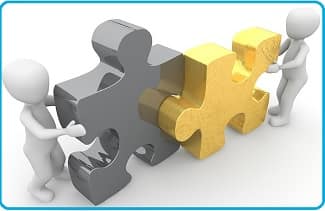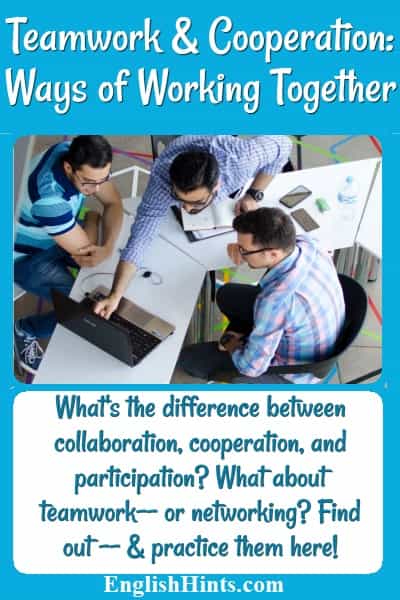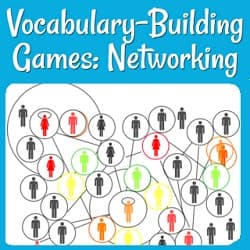Teamwork and Cooperation: 7+ Ways to Talk about Working Together
English has a number of words closely related to teamwork and cooperation. These describe ways people can work together in groups to achieve their goals. They include collaboration, coordination, contribution, partnership, and participation.
After a few explanations and examples of their similarities and differences, there are several ways to practice them (and related words.)
You can start with the explanations, or read or hear the words used in context.
Then try some of the practice exercises: put the words into categories, download a crossword puzzle, complete a gap-fill exercise, and answer multiple choice questions. (The category and gap-fill answers are below the multiple choice.)
Ways of Working Together
1. Collaboration is literally 'working together' toward a common goal.
It can involve two or more people or groups, and is usually more structured and coordinated than cooperation.
(There is another, negative meaning of collaboration: working together with the enemies of one's country.
For example, during World War II the Germans used local people to run the governments of countries they invaded.
Those French, Norwegian, or other people who helped the Germans against their own countrymen were called "collaborators," and were hated as traitors to their country.)
2. Cooperation is voluntarily working together more informally, perhaps offering mutual help so groups or individuals can reach related goals.
3. Coordination is organizing the work of different individuals or groups so it will all fit together and reach the planned goal.
4. A contribution is something given to a common effort. People can contribute money, products, services, or time to their community or a group or cause they believe in.
5. A team is a group of people working together on a common project, each having responsibilities and a part to contribute to the whole. Teams are especially common in sports and at work (where several people may be assigned to the same project for a long period of time.)
Teamwork is important, because if some team members aren't fully committed it limits the success of the whole group. It may even lead to loss of the game or failure of the project.
6. Networking is more informal-- meeting with others that share interests to see if mutually beneficial relationships may grow.
7. Participation means being involved in some kind of activity with other people-- whether collaborating cooperating, networking, being on a team, or coordinating the efforts of others in the group.
Businesses: Working Together (or Alone)
There are three major types of businesses in the United States from a legal viewpoint.
1. A sole proprietorship is a business owned and run by one individual (though he or she may have employees.)
2. A partnership is a business run by two or more individuals cooperatively.
3. A corporation is a business owned by a group of stockholders and run by a Board of Directors. There are legal advantages to incorporating-- the company’s losses and liabilities do not belong to the individuals involved, so there is less risk to the stockholder owners.
Read or Listen: Teamwork in Context
To read or hear about collaboration and its synonyms in context, listen to The TED radio hour on Why We Collaborate or a Voice of America discussion about the future of education, and especially the need to learn critical thinking and collaboration skills.
This BBC article discusses research on why “teams of talented individuals so often underperform?” It uses examples from business, university, and soccer teams. In all of them the researchers found that the social skills or CQ (collective intelligence) of the teams lead to more success than the number of very talented people involved. It’s important (and fascinating) reading.
If you will have a job interview soon, these interview suggestions will be helpful. They also emphasize the importance of teamwork on the job!
Thomas Edison & More Vocabulary
You can also read about some of the other words on this page in context, and learn more about Thomas Edison in a fairly simple Voice of America article on him, or a pbs article on him here. (They will all open in new windows.)
(Edison was one of America's great innovators, and perhaps the first to assemble a team for the purpose of developing new technologies. Much of his work required teamwork and cooperation!)
Categories: Teamwork and Cooperation

Put these words (most related to nouns defined above) into categories:
collaborate, collaborative, collaborator, contribute,
contributor, cooperate, cooperative, coordinate, coordinated, coordinator,
corporate, incorporate, incorporated, participant, participate, partner, partnership.
NOUNS: PEOPLE
VERBS
ADJECTIVES
More Vocabulary (for Practices 2-3)
Assistance is help. Many people have assisted Project Gutenberg-- a major effort to digitize the world’s literature and make it freely available on the Internet.
Colleagues are co-workers (of more or less equal status, unlike supervisors who direct other workers or assistants, helpers who follow directions and usually do not make major decisions). Professionals often speak of their colleagues: fellow professors, lawyers, doctors, architects, etc.
A device is a piece of equipment (often electronic or mechanical) designed for a certain use: a camera, computer, light switch, phone, etc.
Impact- a major effect on something (originally the physical effect of being hit by another object: “The comet’s impact created a huge hole.” Now ‘impact’ is also used of the strong effect an event can have on a person.)
An individual is one separate person. Individuality is uniqueness. Individualism emphasizes people thinking or acting separately rather than choosing what the whole group wants.
Innovation- Finding or inventing a new product or way of doing something.
Legal- connected with the law, or acceptable according to the law.
To maintain something is to keep it working, in a usable condition.
Project - a plan to do, make, or learn something, often requiring a lot of time or resources.
A Quick Gap-fill Practice & A Crossword
This is just to demonstrate how the different parts of speech work in practice. I've written a short thank-you speech of the kind often given at company award dinners.
After each of the blanks you can see what part of speech goes there. Two to four of the words below could fit in each blank. Choose a word for each of the four blanks, then check the bottom of the page for the actual possibilities. (There are many possible correct answers.)
assisted, assistance, assistants, colleagues, contributed to, contributions, contributors, cooperative, coordinated, innovative, maintained, partners, partnership
"We would like to thank our ___________ (noun- person: plural) for their ______________ (adj.) _______________ .(noun)
They ____________(verb, simple past tense) our project throughout its development. They enabled our work to have the impact we hoped for."
You can also practice much of the vocabulary on this page with a crossword puzzle.
(The crossword answers are here.)
Multiple Choice Practice
Choose the best answer to each question, then press the right arrow to move to the next question:
Teamwork and Cooperation Category Answers
NOUNS: PEOPLE
collaborator
contributor
coordinator
participant
partner, partnership
VERBS
collaborate
contribute
cooperate
coordinate
corporation
incorporate
participate
ADJECTIVES
collaborative
cooperative
coordinated
corporate
incorporated
Gap-fill Answers
assisted, assistance, assistants, colleagues, contributed to, contributions, contributors, cooperative, coordinated, innovative, maintained, partners, partnership
"We would like to thank our colleagues (or assistants, contributors or partners) (noun- person: plural) for their cooperative (or innovative) (adj.) contributions (or assistance, or partnership.)(noun)
They coordinated (or assisted, contributed to, or maintained)(verb, simple past tense) our project throughout its development. They enabled our work to have the impact we hoped for."
(You could also use supporters, supportive, support, or supported in those blanks-- but not all at the same time! For example: "We'd like to thank our contributors for their supportive assistance... They maintained our project...")
Related Practice Pages
Can you connect these important words related to networking with their meanings?
Practice basic economic & business vocabulary, from annual, credit and funding to income and incentives.
These sports idioms are common in business and everyday conversation. How many do you understand?
Home> How to Learn Professional Vocabulary > Teamwork and Cooperation.
Didn't find what you
needed? Explain what you want in the search box below.
(For example, cognates, past tense practice, or 'get along with.') Click to see the related pages on EnglishHints.
| site search by freefind | advanced |









